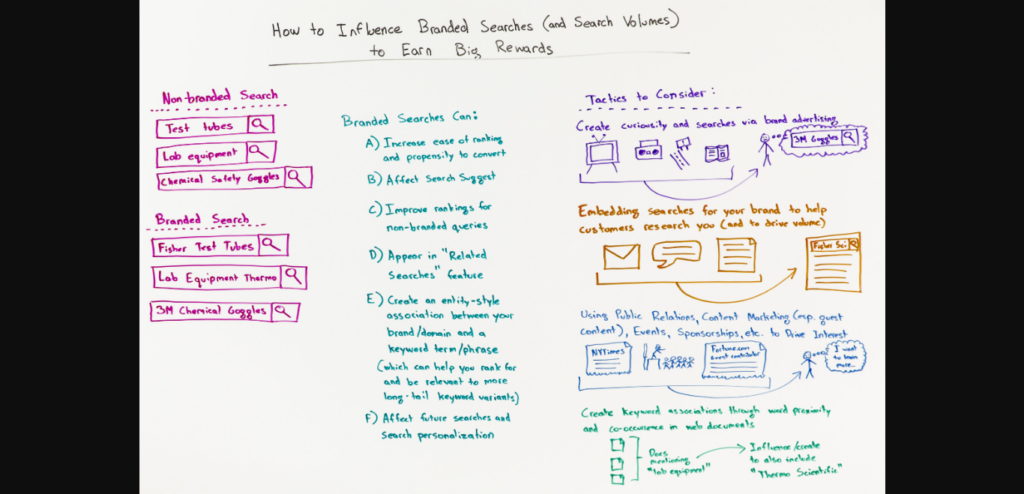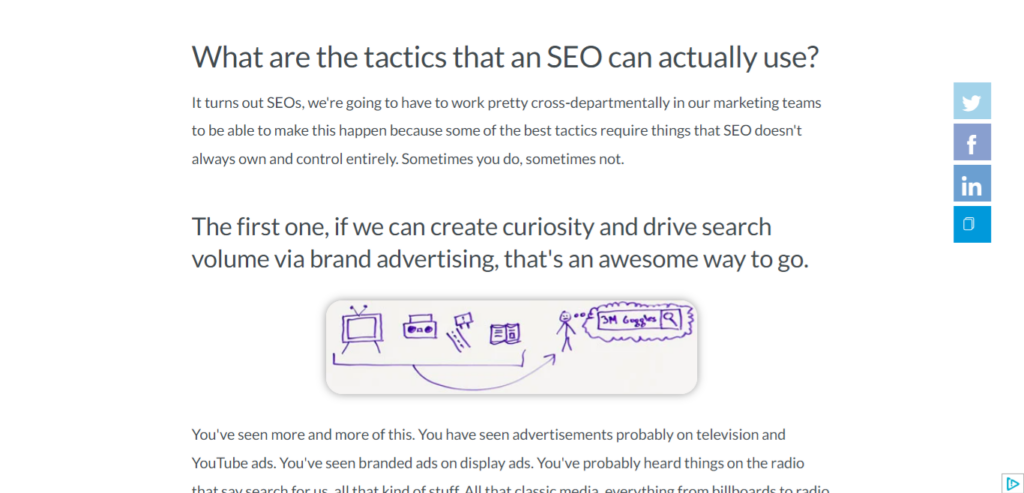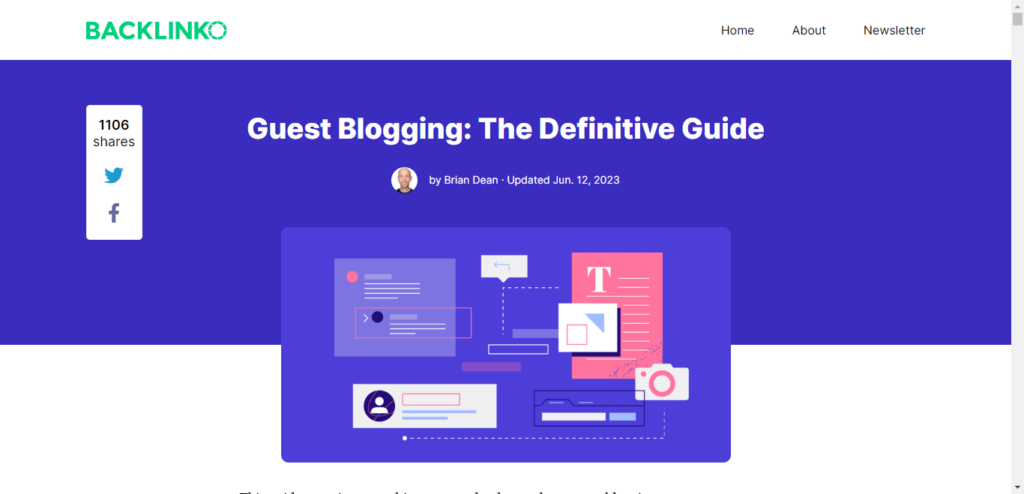If you’re unfamiliar with the legendary Zig Ziglar, he knew a thing or two about branding—and why trust fuels growth.
“If people like you they will listen to you, but if they trust you, they’ll do business with you.“
~ Zig Ziglar
I think we can all agree that online branding is incredibly important.
This is especially true if you’re in an already crowded industry, where being identified as one of the premier brands can literally make or break you.
Gaining a high branded search volume is one reliable way companies come to prominence and build a strong reputation.
But how do you do this?
How can you increase the number of branded searches your company receives?
In this post, I’ll cover practical, repeatable strategies you can use to achieve that objective—both online and off.
Additionally, I’ll discuss some of the specific benefits of maximizing your branded search volume (besides the obvious benefit of building brand equity).
What are branded keywords?
First things first.
It’s a good idea to quickly pinpoint exactly what branded keywords are to ensure you and I are on the same page.
Viden defines a branded keyword as:
“Branded keywords are words or phrases related to your company name, product, or service. These words can be used in search engine optimization (SEO) campaigns to target potential customers specifically looking for your brand. “
In other words, a branded keyword search includes your brand’s name or some variation of it—think Brand + pricing, Brand + reviews, Brand + login, or even product-line names that people associate with you.
The benefits of branded searches
Why should you put the effort into increasing your branded search volume?
Will it really make that big of a difference?
In short, yes. It can have a significant impact.
In his Whiteboard Friday, Rand Fishkin (formerly of Moz) discussed the big rewards of influencing branded searches.
Here’s a screenshot of Rand’s whiteboard with a detailed outline of influencing brand searches:

Of course, there are benefits to improving your brand-related ranking and increasing conversions.
But what’s especially interesting is that gaining more branded search volume can also correlate with better visibility for non-branded queries in your space.
While this was presented as informed speculation, Rand made an excellent point about how repeated brand–topic association can signal relevance to search engines.
Here’s another screenshot that explains his logic:

And the logic tracks.
If you can get your brand to appear in a high volume of searches alongside a particular unbranded phrase, it’s reasonable to think that Google could associate your brand with that phrase and deem it highly relevant.
In turn, your rankings could improve across the board.
The bottom line here is that receiving many branded searches is a very good thing and can provide your company with a major boost on many levels.
Do everything possible to increase your volume of branded searches.
The way I see it, the following strategies are your best bet for accomplishing this.
Work “cross-departmentally”
Rand makes another great point in his Whiteboard Friday video mentioned above.
According to him,
“We’re going to have to work pretty cross-departmentally in our marketing teams to be able to make this happen because some of the best tactics require things that SEO doesn’t always own and control entirely.“
In other words, it’s important to branch out and collaborate across several different areas of marketing.
Some of which aren’t even online.
Here are some ways you can do that.
Coordinate brand moments. Align PR, social, email, and paid campaigns around the same hook, tagline, or offer so people consistently see and search your brand name.
Give people a reason to search. Use memorable codes, unique product names, or “search prompts” (e.g., “Search YourBrand webinar toolkit”) across channels to nudge branded queries.
Make the search satisfying. Ensure your brand SERP (what shows when people Google your name) is clean, helpful, and up to date—more on this below.
Create curiosity
I’ll ask you a question.
What’s the most straightforward way to get more people to search for your brand on Google?
It’s simple.
Make them curious about your brand so they take the time to do a branded search.
But the bigger question is: “How do you create curiosity?”
That’s where things start to get a little tricky.
Rand actually suggests using old-school offline techniques like TV, print, billboards, etc.

These are totally viable outlets for brands with deep pockets.
But this approach probably isn’t suitable for smaller businesses with a shoestring budget.
However, there are techniques that can work for almost any company.
One is simply word-of-mouth marketing.
Recommendations from people you know are consistently the most trusted form of promotion worldwide, according to Nielsen’s multi-year “Trust in Advertising” research.
If you can create brand advocates who willingly spread the word about your business, the world is your oyster, and branded searches are practically guaranteed to follow.
I recommend putting much effort into exceeding customer expectations, providing great customer service, and showcasing real customer stories to create brand advocates.
You may even want to create a formal referral program to catalyze things.
Another avenue to explore is speaking engagements.
The same study mentioned earlier from Visible Experts states that speaking engagements are just behind referrals and the second-best way to build leads.

I realize public speaking isn’t everyone’s cup of tea.
But it’s definitely an effective way to generate buzz and create curiosity.
Just picture it.
You speak at a local event in front of a few hundred people.
Let’s then say half of the attendees want to learn more about your brand and search for you on Google.
Voila! You’ve just increased your branded search volume considerably.
You will probably generate a sizable number of highly qualified leads and directly boost your brand equity.
Just be sure to suggest to the attendees to check out your brand.
Don’t forget digital “stages.” Webinars, virtual conferences, podcasts, LinkedIn Live, and guest Instagram or YouTube takeovers work like modern speaking gigs—and they scale. Close each appearance with a clear verbal cue to search your brand name.
Guest contributions
All right, enough of this offline stuff.
I’ll bring it back to the digital realm.
You probably already know I’m a huge proponent of guest posting.
In my opinion, it’s hands down one of the best inbound marketing techniques and is ideal for increasing brand visibility.
For example, Bryan Harris, who built a full-time business generating over $15,000 a month with a single guest post on Okdork.
I also think this can hold the key to gaining more branded search volume for your website as well.
Here’s the scenario.
You land a couple of guest-blogging opportunities for online publications with significant followings.
You write some killer content that intrigues your audience and sparks curiosity about your company.
Now you might be asking, “Wouldn’t readers just click on the link to my site if they were interested in learning more rather than actually performing a search?”
Touché. That’s a good point.
And it’s true that a sizable portion of readers will access your site this way.
That’s not bad; it will supply you with quality traffic and leads.
However, it’s not directly contributing to a flood of branded searches for you.
It’s fair to say that a respectable number of people will want to learn more about you through a search.
This is especially true if you crush it and create engaging guest posts.
If you want to learn more about the process of guest blogging, I recommend checking out this guide from Backlinko.

It will definitely steer you in the right direction.
Expand beyond blogs. Contribute to industry newsletters, podcasts, YouTube channels, community roundups, and LinkedIn publications. Use a consistent author bio that names your brand and your signature product so people know exactly what to search for.
Brand mentions
Now, my last point.
It’s highly likely that receiving brand mentions (especially from big-name influencers) should positively impact your branded search volume.
Let’s say one of your industry’s top bloggers or experts gives your company a shout-out.
All of a sudden, there’s going to be a significant number of people wanting to know more about you.
Bam! This should spark an increase in Google searches.
Of course, you can’t just snap your fingers and get game-changing brand mentions.
But there are two specific strategies that can greatly help.
One is to create content that influencers will link to.
The other strategy is to engage in a straight-up influencer marketing campaign.
It can not only increase branded searches but also have a profound impact on your overall marketing efforts.
Recent consumer research shows influencer content now drives a measurable share of purchases—many consumers report buying because of something they saw from a creator on Instagram, YouTube, TikTok, or X (formerly Twitter).
I suggest checking out this post from Hootsuite for the skinny on influencer marketing.
Level this up with digital PR. Commission or compile original data, mini-industry reports, or free tools and pitch them to journalists and creators. Respond to journalist request platforms and niche communities. These assets earn authoritative mentions that spark curiosity and searches for your name.
Own your brand SERP
Getting people to search is step one. Step two is making sure what they find is clear, complete, and confidence-building.
Tighten titles and descriptions. Your homepage and key product pages should include your brand name plus a concise value prop. People often search your name + a need—make that connection obvious.
Reinforce entity signals. Keep your logo, organization details, and social profiles consistent across your site and major platforms. Where appropriate, use up-to-date structured data (Organization/Website/Logo) and ensure your preferred site name is recognized so Google displays it correctly on your brand results.
Answer common brand queries. Publish and maintain pages for pricing, reviews, alternatives, careers, and an up-to-date “About” page. These pages tend to earn sitelinks and reduce pogo-sticking on your brand SERP.
Activate community proof. Encourage public reviews and testimonials where appropriate and highlight them on-site. Social proof near your brand name quenches the curiosity your campaigns create.
Measure branded search growth
What gets measured gets improved.
Track queries that contain your brand. Monitor impressions and clicks for brand-name queries in your search performance reports. Watch for lifts after campaigns and events.
Segment traffic properly. Compare branded organic traffic against direct visits and paid search using clear naming in your campaigns. Your goal is more people choosing to search your name—then click you.
Listen to the market. Keep an eye on social mentions, community threads, and support tickets to learn what people associate with your brand—then reinforce those strengths in content and metadata.
Conclusion
When you boil it all down, your objective is very simple.
Get people to search for your company on Google.
This is largely achieved by creating curiosity so that people can’t help but feel compelled to search for your brand—and by ensuring the results they see reinforce trust and relevance.
One of the things I find interesting about this technique is that it’s an aspect of SEO that usually requires a mix of traditional, offline techniques and newer, strictly digital ones to work.
By branching out in different directions to create intrigue and curiosity about your brand across the board—and by owning your brand SERP end to end—you can gain more branded searches to your website and reap a host of rewards in return.
